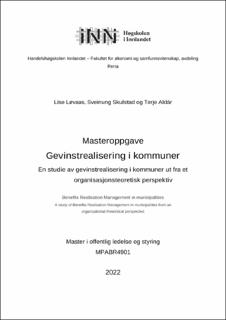| dc.contributor.advisor | | |
| dc.contributor.author | Løvaas, Lise | |
| dc.contributor.author | Aldar, Terje | |
| dc.contributor.author | Skulstad, Sveinung | |
| dc.date.accessioned | 2023-04-24T16:12:52Z | |
| dc.date.issued | 2022 | |
| dc.identifier | no.inn:inspera:110525064:52033995 | |
| dc.identifier.uri | https://hdl.handle.net/11250/3064710 | |
| dc.description.abstract | Formålet med denne masteroppgaven er å undersøke om gevinstrealisering er enda en mote som har nådd kommunesektoren, eller om det er en rasjonell prosess for å nå organisasjoners mål. Vi har undersøkt hvordan gevinstrealisering praktiseres i kommuner i lys av organisasjonsteori om organisasjoner som instrumenter og organisasjoner som institusjoner.
Studiet er gjennomført ved bruk av kombinasjonsmetode. Vi har gjennomført en kvantitativ spørreundersøkelse som er sendt til alle kommuner for å kartlegge utbredelse av gevinstrealisering i kommunene. I tillegg har vi gjennomført en kvalitativ undersøkelse i form av semistrukturerte intervjuer av ni respondenter innenfor én kommune for å innhente dybdekunnskap. Intervjuene og spørreundersøkelsen er planlagt og gjennomført parallelt.
Våre funn viser at gevinstrealisering ikke er en innarbeidet metodikk i alle kommuner som jobber med gevinstrealisering. I vår spørreundersøkelse svarer nesten halvparten av kommunene at metodikken er lite innarbeidet. Intervjuene våre i den ene kommunen viser det samme. Selv om gevinstrealisering kan være relativt nytt i kommunene og noen av kommunene har vært igjennom kommunesammenslåing, og selv om gevinstrealiseringsprosessen er ressurskrevende, er det vår forutsetning at i et instrumentelt perspektiv vil man sørge for å tilføre alt som er nødvendig for at metoden skal fungere.
Vi kan ikke på bakgrunn av våre undersøkelser fastslå om kommunene har innført gevinstrealisering fordi det gir dem en slags ytre legitimitet, altså som en mote, eller om det faktisk er en rasjonell prosess bak innføringen. Det vi ser når vi analyserer svarene vi har innhentet fra spørreundersøkelse og intervju, er imidlertid at mange av svarene peker mot gevinstrealisering som en mote.
Basert på antall gjennomførte intervju, og antall som besvarte spørreundersøkelsen, har vi sannsynligvis for lite empirisk grunnlag til å generalisere på bakgrunn av våre funn. Vi kan altså ikke fastslå at våre resultater vil være gyldige for alle kommuner. | |
| dc.description.abstract | The purpose of this master's thesis is to investigate whether benefit realisation is yet another fashion fad that has reached the municipal sector or whether it is a rational process for achieving an organization's goals. We have investigated how benefit realisation is practised in municipalities in light of organizational theory regarding organizations as instruments and organizations as institutions.
The study was completed using a combination method. We have conducted a quantitative survey that was sent to all municipalities to map the distribution of benefit realisation in the municipalities. We have also conducted a qualitative survey using semi-structured interviews of nine respondents within one municipality to obtain more in-depth knowledge. The interviews and surveys were planned and completed simultaneously.
Our findings show that benefit realisation is not an incorporated methodology in all municipalities that operate with benefit realisation as part of their system. In our survey, almost half of the municipalities report that the methodology is incorporated to a very limited extent. Our interviews in one municipality showed the same result. Although benefit realisation may be relatively new in the municipalities and some of the municipalities have undergone municipal mergers, and although the benefit realisation process is resource-intensive, it is our assumption that – from an instrumental perspective – one would be willing to do everything it takes to make the method work.
Based on our investigations, we cannot determine whether the municipalities have introduced benefit realization because it gives them some kind of external legitimacy, i.e. as a fashion fad, or whether there is actually a rational process behind its introduction. However, what we do see when analysing the responses we gathered from surveys and interviews is that many of the responses point to benefit realisation as a fashion trend.
Based on the number of interviews conducted and the number of people who responded to the survey, we probably have too little empirical information to generalise on the basis of our findings. In other words, we cannot establish that our results will be valid for all municipalities. | |
| dc.language | nob | |
| dc.publisher | Inland Norway University | |
| dc.title | Gevinstrealisering i kommuner
En studie av gevinstrealisering i kommuner ut fra et organisasjonsteoretisk perspektiv | |
| dc.type | Master thesis | |
